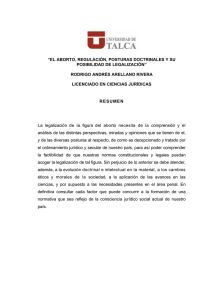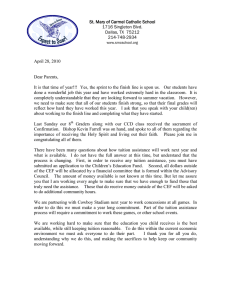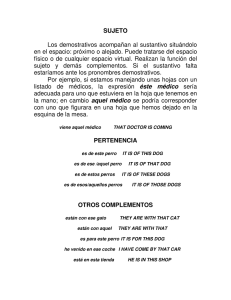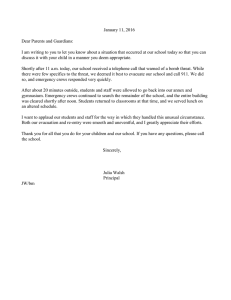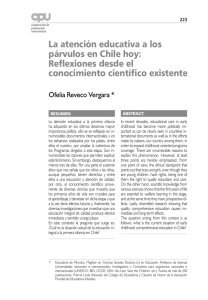MV Segunda Generación: La Armadura Invisible Second
Anuncio
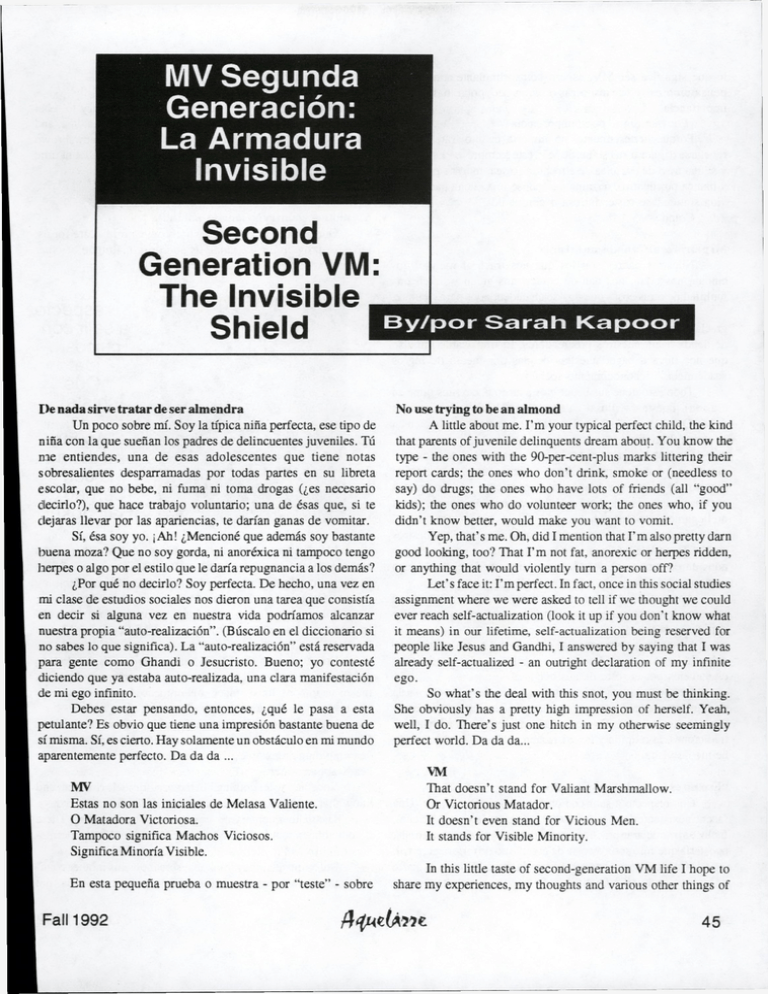
MV Segunda Generación: La Armadura Invisible Second Generation VM: The Invisible By/por Shield Sarah Kapoor J De nada sirve tratar de ser almendra Un poco sobre mí. Soy la típica niña perfecta, ese tipo de niña con la que sueñan los padres de delincuentes juveniles. Tú me entiendes, una de esas adolescentes que tiene notas sobresalientes desparramadas por todas partes en su libreta escolar, que no bebe, ni fuma ni toma drogas (¿es necesario decirlo?), que hace trabajo voluntario; una de ésas que, si te dejaras llevar por las apariencias, te darían ganas de vomitar. Sí, ésa soy yo. ¡ Ah! ¿Mencioné que además soy bastante buena moza? Que no soy gorda, ni anoréxica ni tampoco tengo herpes o algo por el estilo que le daría repugnancia a los demás? ¿Por qué no decirlo? Soy perfecta. De hecho, una vez en mi clase de estudios sociales nos dieron una tarea que consistía en decir si alguna vez en nuestra vida podríamos alcanzar nuestra propia "auto-realización". (Búscalo en el diccionario si no sabes lo que significa). La "auto-realización" está reservada para gente como Ghandi o Jesucristo. Bueno; yo contesté diciendo que ya estaba auto-realizada, una clara manifestación de mi ego infinito. Debes estar pensando, entonces, ¿qué le pasa a esta petulante? Es obvio que tiene una impresión bastante buena de sí misma. Sí, es cierto. Hay solamente un obstáculo en mi mundo aparentemente perfecto. Da da da ... No use trying to be an almond A little about me. I'm your typical perfect child, the kind that parents of juvenile delinquents dream about. You know the type - the ones with the 90-per-cent-plus marks littering their report cards; the ones who don't drink, smoke or (needless to say) do drugs; the ones who have lots of friends (all "good" kids); the ones who do volunteer work; the ones who, if you didn't know better, would make you want to vomit. Yep, that's me. Oh, did I mention that I'm also pretty darn good looking, too? That I'm not fat, anorexic or herpes ridden, or anything that would violently turn a person off? Let's face it: I'm perfect. In fact, once in this social studies assignment where we were asked to tell if we thought we could ever reach self-actualization (look it up if you don't know what it means) in our lifetime, self-actualization being reserved for people like Jesus and Gandhi, I answered by saying that I was already self-actualized - an outright declaration of my infinite ego. So what's the deal with this snot, you must be thinking. She obviously has a pretty high impression of herself. Yeah, well, I do. There's just one hitch in my otherwise seemingly perfect world. Da da da... VM That doesn't stand for Valiant Marshmallow. Or Victorious Matador. It doesn't even stand for Vicious Men. It stands for Visible Minority. MV Estas no son las iniciales de Melasa Valiente. O Matadora Victoriosa. Tampoco significa Machos Viciosos. Significa Minoría Visible. En esta pequeña prueba o muestra - por "teste" - sobre Fall 1992 In this little taste of second-generation VM life I hope to share my experiences, my thoughts and various other things of flfyizlAw 45 lo que significa ser MV, espero compartir mis experiencias, pensamientos y varias otras cositas de poca o ninguna importancia. ¿Por qué digo "poca importancia"? Porque honestamente, no importa cuánto trate una de rebelarse o ignorar su estatus de MV, éste siempre te va a afectar, y si una trata de dárselas de almendra (o sea, morena por fuera y blanca por dentro), termina pasándose una buena parte de la vida sintiéndose triste, furiosa o confundida. Como yo. Mi patria es el Canadá, no la India Nuestros padres son los que nos traen al mundo, nos cuidan, nos crian, nos dan de comer, nos guían y hacen una multitud de otras cosas que nos dejan endeudados para siempre. Es la palabra "endeudados" la que actúa como golpe de gracia en muchas familias MV Segunda Generación. Ese sentido de deuda hacia nuestros procreadores. El implacable impulso que nos lleva a pagar nuestras deudas por medio de logros académicos o reconocimiento social. Todo esto tiene sus beneficios a largo plazo (nos pone en esa ¡oh!-¡qué-maravillosa! categoría de "Hijos de Inmigrantes A Los Que Siempre Les Va Tan Bien") y además queda bien en un curriculum vitae. Sin embargo, a corto plazo pareciera que lo hacemos para glorificar a nuestros progenitores y para ganar algún tipo de respeto. Y esto hace que inconcientemente nos pongamos encima un inmenso peso de culpabilidad cuando algunas veces no llegamos a ser los mejores. Yo creo que es el temor al fracaso lo que empuja a nuestros padres. Cuando ellos llegaron a su nuevo país, se esmeraron por años en construir una vida honrada, trabajando el doble para mantenerse a flote. Ahora quieren sólo lo mejor para sus hijos, y saben que nosotros tenemos que esforzarnos tres veces más que el resto para tener éxito. La madre patria nunca se les sale del cuerpo. Hay algo sobre la India (y todas las madres patrias) que impregna a sus ciudadanos por el resto de sus días. Desafortunadamente, nuestros padres creen que esa patria es también parte de nuestros cuerpos. Pero mi patria es el Canadá, no la India. Yo no puedo, así como así, adoptar las tradiciones, la religión y las costumbres de un país donde sólo he ido de visita. "Eso no es parte de nuestra cultura" Con respecto a salir con chicos ... ¡Ja! ¡Qué chiste! Una faceta inexistente de mi vida de tortitas de arroz (soy vegetarian a). Incluso si me dejaran practicar esta actividad social tan "inmoral", apostaría que sólo sería a costa de algún tipo de tortura paternal. ¿Cuántas veces has escuchado la frase "Eso no es parte de nuestra cultura"? Queridísimos papito y mamita, ¿de la 46 little or no importance. Why do I say "little importance?" Because, honestly, no matter how hard you try to rebel against or ignore your VM status, it will always affect you, and if you try to fool yourself into being an almond (you know, brown on the outside, white on the inside) you' 11 just spend a lot of time being miserable, angry and confused. Like me. My mother country is Canada, notlndia Our parents are the ones who bring us forth, care for us, raise us, provide for us, guide us and do a multitude of other things that forever leave us indebted. "...respecto a salir con chicos... ¡Ja! ¡Qué chiste!" "As far as dating is concerned... Ha! Joke!" It's that last word in the previous sentence that is the kicker in a lot of second-generation families. The sense of debt to our procreators. The relentless drive to fulfil our debts by means of academic achievement or social recognition. All of it benefits us in the long run (putting us in that ohso-wonderful category of "Immigrants' Children Who Always Do Well") and looks good on a resume. However, on a short-term basis it seems that we do it to glorify our ancestry and to earn some sort of respect. And that makes us unconsciously place this immense burden of guilt on ourselves when we sometimes fail to be the best. I think that it's this fear of failure that fuels our parents. When they came to their new country, they spent painstaking years building a reputable life, working twice as hard to keep their heads above water. Now they want nothing but the best for their children, and know that we have to work three times as hard to succeed. The mother country never gets out of their system. There is something about India (and all other homelands) that permeates its citizens for life. Unfortunately, they think that somehow this mother country is in our systems too. My mother country is Canada, not Otoño 1992 cultura de quién están hablando? Déjenme aclarar la idea. Yo puedo ser quien quiera, hacer lo que quiera y lograr cualquier objetivo que mi corazoncito desee, excepto cuando se trata de la práctica del arte ritual occidental de salir con chicos. Entonces, acá me encuentro, sentadita este viernes por la noche, en pleno verano de mi vida de adolescente, en mi cuarto occidental, con mis pensamientos occidentales y mi inexistente sentido de moralidad oriental. ¿Cuál es el resultado de todo esto? Una chica de dieciséis años, quejosa, irritable, sola y sin novio. Y me atrevo a decir "desenfrenada"? Para ser honesta, realmente no creo que nosotras, MV Segunda Generación nos entregaríamos a las perversidades del libertinaje, eso es, por supuesto, si alguna vez logramos tener algo de libertad. Simplemente, sería bonito poder socializar de vez en cuando en un grupo mixto. Tal vez yo viva en la punta extrema de la dominación paterna, pero en comparación con otros que he conocido, soy un ejemplo común y corriente de autonomía. Déjenme tratar de explicarles esto a mis amigas que no son MV Segunda Generación. Todos los pretextos. Todas las invitaciones que he tenido que declinar. Todas las falsas apariencias que he tenido que construir para poder seguir "las reglas" y al mismo tiempo dar la impresión de que no estoy atada por ellas. Tanto esfuerzo por ser "normal". Y todo, para nada. O sea, aquí estamos todas las MV Segunda Generación, tratando por todos los medios de ser parte de esta sociedad, de "pertenecer" pero con permiso sólo para "pertenecer" hasta cierto punto. Me carga ser la hipócrita que estoy obligada a ser. Creo que confundimos a nuestros compañeros que no son segunda generación. Caminamos igual que ellos, hablamos igual, aprendemos igual y entonces, ¡pum! Nos encontramos en una situación en la que nos invitan a salir (más allá de nuestras definidas pero rigurosamente indefinidas fronteras), y nos encogemos, como si nos hubieran pinchado con una aguja. Y en cierto sentido nos han pinchado con una aguja. Estamos sujetas por una aguja que nos atraviesa la mente hasta que la parte nuestra que responde al sexo opuesto pierde toda confianza y se llenade miedo. Miedo a vivir. Miedo aexperimentar con lo desconocido. Miedo a dejar caer el escudo invisible que nos protege, pero que nos presta esa protección a costa de la soledad y el aislamiento. Sarah Kapoor tiene dieciséis años y es alumna de la Escuela Secundaria Prince Charles en Crestón, British Columbia. Sarah escribe una columna para el periódico Crestón Advance. Versión editada del artículo "Conversemos sobre mi Segunda Generación:, publicado en el Vancouver Sun, Agosto/ 92. Traducción de Carmen Aguirre Fall 1992 India. I can't just readily adopt the traditions, religion and ways of a country that I've only visited. "That's not part of our culture" As far as dating is concerned... Ha! Joke! A non-existent facet of my rice cake life (I'm a vegetarian). Even if you' re allowed to engage in this "immoral" form of social activity I'd like to place a bet that it is not without parental torture of some sort. How many times have you heard the phrase, "That's just not part of our culture"? Just whose culture are you preaching about, Mommy and Daddy dearest? Let me get this straight. I can be whoever I want, do whatever I want and accomplish any goal my little heart desires, except when it comes to engaging in the ritual Western art of dating. So here I sit on this Friday night, in the summer prime of my teenage life, in my Western room with my Western thoughts and my non-existent sense of Eastern morals. So what does that leave you with? A whiny, irritable, dateless - dare I say wanton - 16-year-old. Quite honestly, I really don't think any of us secondgeneration VMs would indulge in the evils of freedom - assuming, of course, we'll ever get any. It just would be nice to socialize sometimes. In a mixed crowd. Perhaps I live at the extreme end of parental domination, but in comparison to others I've seen within the secondgeneration VM crowd, I'm a regular example of autonomy. Let me try explaining that to my non-second-generation VM friends. All the excuses. All the invitations I've had to tum down. All the pretences I've made up in order to abide by "the rules" and at the same time not seem to be bound by them. All the effort to be "normal". All for nothing. I mean, here's the lot of us, trying our damnedest to fit in to a certain degree. I hate being the hypocrite that I am forced to be. I think that we confuse our non-second-generation counterparts. We walk the same, learn the same and then whammo! We're confronted with a situation where we're asked to go out (beyond our severely undefinable defined boundaries) and we withdraw as if we've been stuck by a pin. And in a sense, we have been. Stuck by a pin that goes through our minds until the part of us that reacts to the opposite sex loses confidence and becomes afraid. Afraid to live. Afraid to experience the unknown. Afraid to drop the invisible shield that protects us, but gives us that protection for the price of isolation. www Sarah Kapoor is a 16-year-old student at Prince Charles Secondary School in Crestón. She writes a column for the Crestón Advance. Edited version of the article "Talk about my Second Generation", published in The Vancouver Sun, August/92. Wit 47
